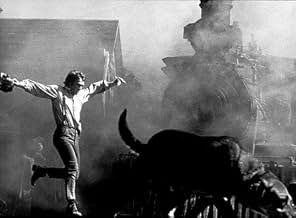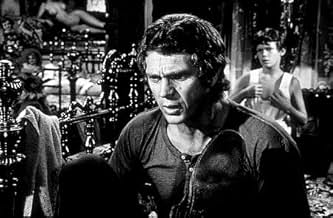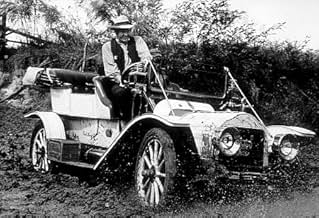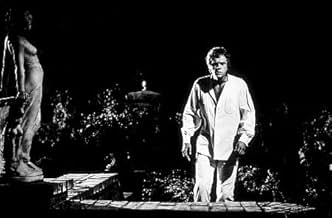IMDb-BEWERTUNG
6,6/10
3373
IHRE BEWERTUNG
Ein 11-jähriger Junge wird volljährig, als zwei schelmische erwachsene Freunde ihn überreden, das Familienauto für eine Reise nach Memphis und eine Reihe von Abenteuern auszuschlachten.Ein 11-jähriger Junge wird volljährig, als zwei schelmische erwachsene Freunde ihn überreden, das Familienauto für eine Reise nach Memphis und eine Reihe von Abenteuern auszuschlachten.Ein 11-jähriger Junge wird volljährig, als zwei schelmische erwachsene Freunde ihn überreden, das Familienauto für eine Reise nach Memphis und eine Reihe von Abenteuern auszuschlachten.
- Für 2 Oscars nominiert
- 5 Nominierungen insgesamt
Handlung
WUSSTEST DU SCHON:
- WissenswertesMitch Vogel broke a shoulder during the shooting.
- PatzerWhen Boon, Ned and Lucius begin their trip to Memphis in the Winton the beginning of the scene is filmed in a traveling shot. As the journey proceeds we hear noticeably on the soundtrack the camera truck's motor in addition to the Winton's.
- Zitate
Boon Hoggenbeck: Sometimes you have to say goodbye to the things you know and hello to the things you don't!
- Crazy Creditsand introducing Mitch Vogel as Lucius
- VerbindungenFeatured in Steve McQueen: Man on the Edge (1989)
Ausgewählte Rezension
Steve McQueen tools around in a classy car, dodging bad guys, loving the ladies, and not giving a cuss. This may read like your typical 1960s effort from him, but that's something "The Reivers" ain't.
What is it? I guess it can be summed up as a broad coming-of-age comedy set in the American South in 1905, featuring a boy named Lucius (Mitch Vogel) who, against his better judgment, sets off with a couple of older-but-not-wiser friends in his grandfather's stolen automobile to visit the wicked city of Memphis. In no time he is holed up in a local bordello, trying to help win back his grandfather's car in a desperate horse race.
At the center of Lucius's worries is the man who talked him into the whole adventure, Boon Hoggenbeck, who wants the car to impress one of the pretty Memphis prostitutes he has set his cap on. "He knows no obstacles, counts no costs, fears no dangers," Grandpa (Will Geer) warns young Lucius of Boon.
Okay, that does sound like McQueen the way Gramps put it there. But McQueen's Boon is more of an overgrown boy than stolid icon. A bucolic coming-of-age comedy based on a William Faulkner novel, "The Reivers" seems McQueen's attempt at stretching out from action-hero mode. He's quite a bit of fun with his sometimes outsized comic reactions, a bit old for the part but certainly a capable center in what amounts to his first ensemble piece since "The Great Escape."
Director Mark Rydell made life-affirming American-heartland flicks that celebrate homey characters and downhome values, and "The Reivers" certainly fits his oeuvre. He is abetted wonderfully by the sunny lenswork of Richard Moore and a graceful, jaunty score by John Williams. In its elegiac, serio-comic tone, it is a lot like the film McQueen chose to make this over, "Butch Cassidy And The Sundance Kid."
More a situation than a story, "The Reivers" introduces us to a shifting cast of characters and lets each spend some time with the viewer. Some leave stronger marks than others.
Rupert Crosse leaves the deepest impression as Lucius' distant black relative Ned, who drives Boon crazy asserting his rights as a member of the McCaslin family by virtue of a great-grandfather who impregnated a slave. Ned is a proud man who likes to push his point beyond the bounds of reason, stowing away on Grandfather's car when Boon and Lucius make their Memphis trip.
"If I wait until I'm invited I'll never will go anywhere," Ned points out when Boon tries unsuccessfully to toss him. Ned is the agent provocateur in "The Reivers," somewhat dangerous in his ways but valuable, too, played with a vulnerable, humor-filled grandeur by Crosse, who got an Oscar nomination for his work. You laugh more with him than at him, but it's a bit of both.
Where "The Reivers" goes a little wrong is with some of the other characters. Sharon Farrell is the proverbial prostitute with a heart of gold who bonds with Lucius, while other smaller parts are filled by memorable character actors who get little to do. "We were a pleasant and courteous people, tending to our business," Burgess Meredith explains in the voice-over narration, and often they seem a bit too much of just that. Even the bad guys, like a racist sheriff played by Clifton James, seem a bit toothless and too-easily- handled.
Still, I enjoyed this film, if more around the margins than in the main. It's not unusual to see McQueen wielding a pistol, but it is to watch the target josh him about his lousy aim between shots. Aided especially by Crosse and Vogel, "The Reivers" isn't maybe as wise or knowing as it tries to be, but does leave you with a warm and fuzzy feeling that doesn't stale with repeat viewings. A sleepy charmer, it shows even a king can make for a capable jester once in a while.
What is it? I guess it can be summed up as a broad coming-of-age comedy set in the American South in 1905, featuring a boy named Lucius (Mitch Vogel) who, against his better judgment, sets off with a couple of older-but-not-wiser friends in his grandfather's stolen automobile to visit the wicked city of Memphis. In no time he is holed up in a local bordello, trying to help win back his grandfather's car in a desperate horse race.
At the center of Lucius's worries is the man who talked him into the whole adventure, Boon Hoggenbeck, who wants the car to impress one of the pretty Memphis prostitutes he has set his cap on. "He knows no obstacles, counts no costs, fears no dangers," Grandpa (Will Geer) warns young Lucius of Boon.
Okay, that does sound like McQueen the way Gramps put it there. But McQueen's Boon is more of an overgrown boy than stolid icon. A bucolic coming-of-age comedy based on a William Faulkner novel, "The Reivers" seems McQueen's attempt at stretching out from action-hero mode. He's quite a bit of fun with his sometimes outsized comic reactions, a bit old for the part but certainly a capable center in what amounts to his first ensemble piece since "The Great Escape."
Director Mark Rydell made life-affirming American-heartland flicks that celebrate homey characters and downhome values, and "The Reivers" certainly fits his oeuvre. He is abetted wonderfully by the sunny lenswork of Richard Moore and a graceful, jaunty score by John Williams. In its elegiac, serio-comic tone, it is a lot like the film McQueen chose to make this over, "Butch Cassidy And The Sundance Kid."
More a situation than a story, "The Reivers" introduces us to a shifting cast of characters and lets each spend some time with the viewer. Some leave stronger marks than others.
Rupert Crosse leaves the deepest impression as Lucius' distant black relative Ned, who drives Boon crazy asserting his rights as a member of the McCaslin family by virtue of a great-grandfather who impregnated a slave. Ned is a proud man who likes to push his point beyond the bounds of reason, stowing away on Grandfather's car when Boon and Lucius make their Memphis trip.
"If I wait until I'm invited I'll never will go anywhere," Ned points out when Boon tries unsuccessfully to toss him. Ned is the agent provocateur in "The Reivers," somewhat dangerous in his ways but valuable, too, played with a vulnerable, humor-filled grandeur by Crosse, who got an Oscar nomination for his work. You laugh more with him than at him, but it's a bit of both.
Where "The Reivers" goes a little wrong is with some of the other characters. Sharon Farrell is the proverbial prostitute with a heart of gold who bonds with Lucius, while other smaller parts are filled by memorable character actors who get little to do. "We were a pleasant and courteous people, tending to our business," Burgess Meredith explains in the voice-over narration, and often they seem a bit too much of just that. Even the bad guys, like a racist sheriff played by Clifton James, seem a bit toothless and too-easily- handled.
Still, I enjoyed this film, if more around the margins than in the main. It's not unusual to see McQueen wielding a pistol, but it is to watch the target josh him about his lousy aim between shots. Aided especially by Crosse and Vogel, "The Reivers" isn't maybe as wise or knowing as it tries to be, but does leave you with a warm and fuzzy feeling that doesn't stale with repeat viewings. A sleepy charmer, it shows even a king can make for a capable jester once in a while.
Top-Auswahl
Melde dich zum Bewerten an und greife auf die Watchlist für personalisierte Empfehlungen zu.
- How long is The Reivers?Powered by Alexa
Details
Box Office
- Budget
- 5.000.000 $ (geschätzt)
- Laufzeit1 Stunde 47 Minuten
- Seitenverhältnis
- 2.35 : 1
Zu dieser Seite beitragen
Bearbeitung vorschlagen oder fehlenden Inhalt hinzufügen























